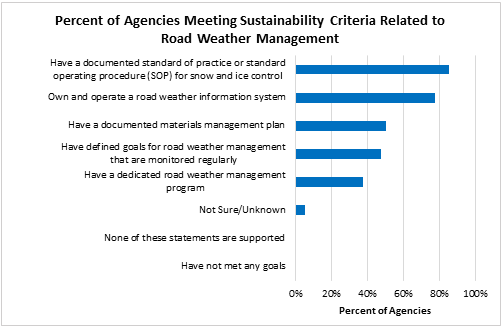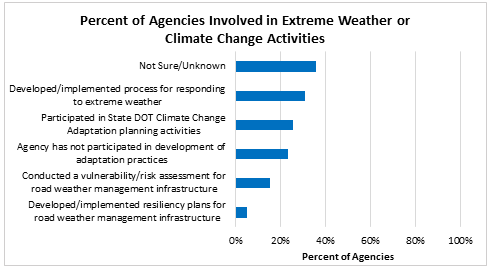CHAPTER 11. OBJECTIVE 8: OPERATIONS COMMUNITY IS ENGAGED WITH CLIMATE CHANGE & SUSTAINABILITY COMMUNITIES
As climate changes, extreme weather and sustainability become more of a concern to State departments of transportation (DOT). The Road Weather Management Program (RWMP) continues to highlight the important role that transportation systems management and operations have in ensuring that current and future program effectiveness is maintained. In many ways, activities in this objective are geared towards mitigating the economic, environmental, and social risks of changes occurring to the transportation system. The following two performance measures (PM) provide an assessment of how State DOTs are viewing sustainability, climate change, and extreme weather.
PM #26: Number of public agencies meeting sustainability criteria related to road weather management
Sustainability is an area of increased interest to the Federal Highway Administration (FHWA), as evidence by the development and promotion of the INVEST online tool to help agencies incorporate sustainability principles into the transportation system. RWMP is gauging the use of INVEST and other sustainability criteria in road weather management. Specifically, for this performance measure, INVEST has criteria that agencies can score themselves against to track progress along sustainability and climate change initiatives.
In the State DOT survey, DOTs reported progress towards developing and implementing sustainability criteria related to road weather management as identified by the Infrastructure Voluntary Evaluation Sustainability Tool (INVEST). An overwhelming majority (95 percent) of State DOTs are pursuing some sort of sustainability effort related to road weather management. The most common sustainability activity among State DOTs is having a documented standard of practice or standard operation procedure (SOP) for snow and ice control. The least common is having a dedicated road weather management program, as illustrated in Figure 21.
 Figure 21. Graph. Percent of Agencies Meeting Sustainability Criteria Related to Road Weather Management.
Figure 21. Graph. Percent of Agencies Meeting Sustainability Criteria Related to Road Weather Management.
PM #27: Number of agencies conducting vulnerability/risk assessments, developing/implementing resiliency plans or adaptation plans, for their road weather management infrastructure and processes to respond to climate change and extreme weather
This performance measure gauges the participation of State DOT operations and maintenance (O&M) groups in climate change adaptation activities in the region/State. This performance measure reflects an emerging area for RWMP pertaining to climate change and extreme weather. In the State DOT survey, agencies reported on their level of participation in extreme weather or climate change adaptation practices. The results, shown in Figure 22, support this is an emerging area of practice. Thirty-six percent expressed being uncertain about their State's activities related to climate change and extreme weather. However, there is some activity to report. Thirty one percent reported having developed/implemented process for responding to extreme weather.
 Figure 22. Graph. Percent of Agencies Involved in Extreme Weather or Climate Change Activities.
Figure 22. Graph. Percent of Agencies Involved in Extreme Weather or Climate Change Activities.
Summary
Overall, State DOTs, especially the northern-tier States, meet most of the programmatic criteria identified in INVEST. In general, States have plans to respond to extreme weather, but limited participation in broader efforts involving climate change within the State.